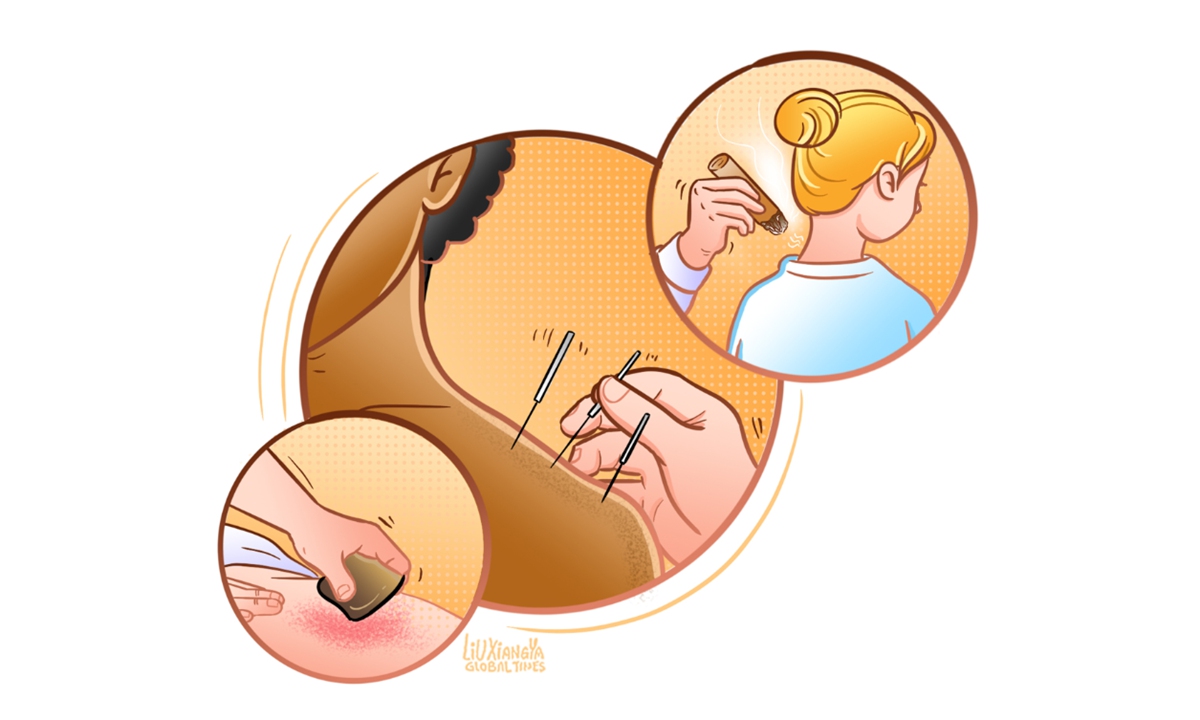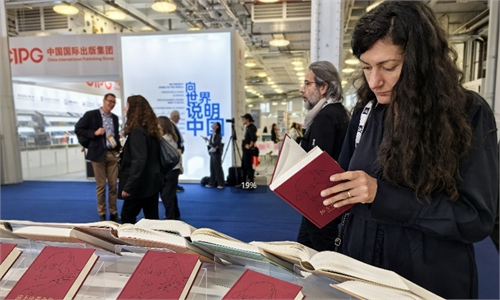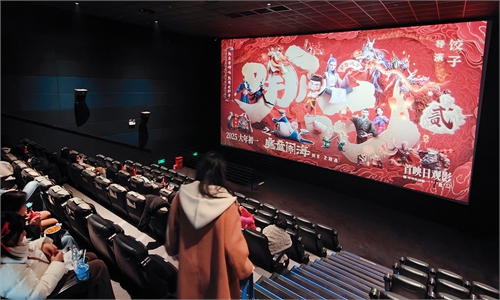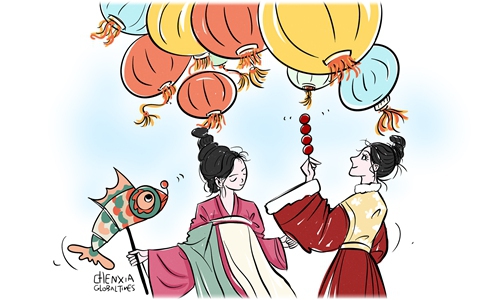ARTS / CULTURE & LEISURE
TCM gains more global appeal in digital age

Illustration: Liu Xiangya/GT
Foreigners have been more aware that traditional Chinese medicine (TCM) has scientific basis and the global growing interest in turning to TCM to solve wellness problems is helping shed its "mystical" label and earn it trust as an effective medical practice. The latest striking example of this shift happened when US influencer IShowSpeed streamed his recent experience with acupuncture and bone setting in Chengdu, Southwest China's Sichuan Province.
The YouTube sensation, who boasts over 37 million followers on the platform, streamed his trip to Chengdu on Monday, following three other trips across China. During the livestream, IShowSpeed visited a local traditional Chinese medicine store, where he explored various practices such as pulse diagnosis, bone setting, and acupuncture. Initially apprehensive about the pain from the acupuncture needles, the influencer expressed his fear at first. However, after some persuasion, he decided to experience the treatment and was so pleasantly surprised to find that his headache had disappeared.
The livestream video has been viewed more than 7.6 million times as of Tuesday and has gone viral on social media platforms within China and abroad.
For these viewers, this live broadcast served as an entry point into the world of TCM, highlighting its practical effectiveness.
For many foreigners, TCM is initially perceived as an exotic and mysterious practice rooted in cultural tradition rather than science.
However, direct experiences with TCM are increasingly challenging this perception. In Han Shiming's moxibustion store in Hunchun, Northeast China's Jilin Province, there have often been Russians crossing the border specifically to do moxibustion in recent years.
"We receive thousands of Russian visitors each year, with the farthest travelers coming from cities like Moscow and St. Petersburg. They came specifically to improve their health, with most seeking treatment for issues such as cervical spondylosis and shoulder periarthritis," Han told the Global Times, adding that many of these foreigners were recommended by their friends or relatives and have been gradually growing familiar with the traditional treatment approach and philosophy of TCM during their experiences.
These overseas guests have expressed satisfaction with the effectiveness of the treatments, Han noted, a sentiment illustrated by the banners in Russian that adorn the store's walls. The messages from patients on these banners include complimentary phrases such as "Exquisite Medical Skills" and "Miraculous Traditional Chinese Medicine."
Sun Zhijia, professor of the Third Affiliated Hospital of Guangzhou University of Chinese Medicine in South China's Guangdong Province, also uses his TCM skills to relieve the troubles of some foreign patients.
"Recently, there was even a German patient, who had severe cold symptoms. He came for a consultation and wanted to try TCM. After taking the herbs, his fever subsided the very next day, and his symptoms began to improve," Sun told the Global Times.
Another patient from Belgium who had been suffering from a chronic cough for a long time, with poor results from treatment in his home country, was introduced to Sun.
"After some online consultations and a detailed medical history review, we determined that the cough was actually caused by a digestive system disorder. In TCM, we say that 'all the internal organs can cause coughing, not just the lungs.' So we prescribed a herbal remedy that targeted the digestive system, and it turned out to be quite effective," Sun said.
These personal stories, alongside high-profile events such as IShowSpeed's livestream, are pivotal in breaking down the "mystical" stereotype of TCM, reframing it as a credible healthcare option grounded in tangible results.
The personal experiences and grassroots initiatives are also increasingly driving the modern wave of TCM's global popularity. For instance, moxibustion halls in Northeast China such as Han's have gained a loyal international following based on word-of-mouth recommendations about their effectiveness. Similarly, Beijing Massage Hospital has leveraged "Diplomatic Experience Days" to introduce foreign diplomats to TCM, breaking cultural barriers through hands-on interaction. IShowSpeed's livestream, which reached millions of viewers worldwide, represents another example of how grassroots advocacy and digital platforms are propelling TCM into the global spotlight.
At the same time, to fully realize its potential, TCM must address the challenges of its international communication. In order to effectively communicate the richness of TCM culture to an overseas audience, a variety of methods - both online and offline - are being employed.
For example, in the Chinese animation blockbuster Ne Zha 2 that has been released in dozens of countries around the world such as the US, Australia and over 30 European countries, there's a memorable scene in which General Li Jing of Chentang Pass hands Shen Gongbao a list of medicinal herbs to buy.
In terms of promoting TCM, Sun Haishu, associate professor with the China Academy of Chinese Medical Sciences in Beijing, said that the film has had positive significance.
"The influence of the IP has helped awaken public cultural recognition of TCM. TCM is not outdated. In ancient times, its effectiveness was evident everywhere and is well-documented in historical texts. Even in modern-day efforts to treat disease, TCM still has a role to play. Hopefully, it can be further developed and fully utilized," Sun told the Global Times.
The author is a reporter with the Global Times. life@globaltimes.com.cn




